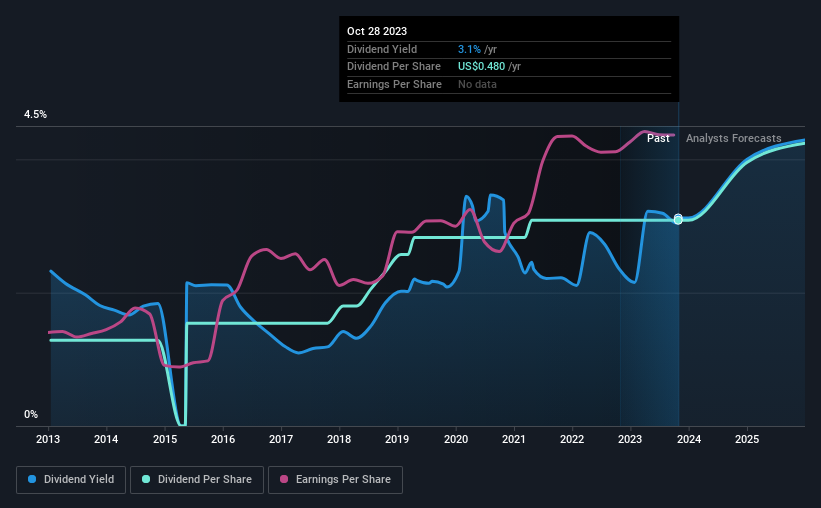Is It Smart To Buy Central Valley Community Bancorp (NASDAQ:CVCY) Before It Goes Ex-Dividend?
Readers hoping to buy Central Valley Community Bancorp (NASDAQ:CVCY) for its dividend will need to make their move shortly, as the stock is about to trade ex-dividend. The ex-dividend date occurs one day before the record date which is the day on which shareholders need to be on the company's books in order to receive a dividend. The ex-dividend date is an important date to be aware of as any purchase of the stock made on or after this date might mean a late settlement that doesn't show on the record date. This means that investors who purchase Central Valley Community Bancorp's shares on or after the 2nd of November will not receive the dividend, which will be paid on the 17th of November.
The company's next dividend payment will be US$0.12 per share. Last year, in total, the company distributed US$0.48 to shareholders. Calculating the last year's worth of payments shows that Central Valley Community Bancorp has a trailing yield of 3.1% on the current share price of $15.38. If you buy this business for its dividend, you should have an idea of whether Central Valley Community Bancorp's dividend is reliable and sustainable. So we need to investigate whether Central Valley Community Bancorp can afford its dividend, and if the dividend could grow.
View our latest analysis for Central Valley Community Bancorp
If a company pays out more in dividends than it earned, then the dividend might become unsustainable - hardly an ideal situation. Central Valley Community Bancorp has a low and conservative payout ratio of just 21% of its income after tax.
Generally speaking, the lower a company's payout ratios, the more resilient its dividend usually is.
Click here to see the company's payout ratio, plus analyst estimates of its future dividends.
Have Earnings And Dividends Been Growing?
Companies with consistently growing earnings per share generally make the best dividend stocks, as they usually find it easier to grow dividends per share. If earnings fall far enough, the company could be forced to cut its dividend. Fortunately for readers, Central Valley Community Bancorp's earnings per share have been growing at 15% a year for the past five years.
Many investors will assess a company's dividend performance by evaluating how much the dividend payments have changed over time. Since the start of our data, 10 years ago, Central Valley Community Bancorp has lifted its dividend by approximately 9.1% a year on average. We're glad to see dividends rising alongside earnings over a number of years, which may be a sign the company intends to share the growth with shareholders.
To Sum It Up
Is Central Valley Community Bancorp an attractive dividend stock, or better left on the shelf? Companies like Central Valley Community Bancorp that are growing rapidly and paying out a low fraction of earnings, are usually reinvesting heavily in their business. Perhaps even more importantly - this can sometimes signal management is focused on the long term future of the business. Overall, Central Valley Community Bancorp looks like a promising dividend stock in this analysis, and we think it would be worth investigating further.
In light of that, while Central Valley Community Bancorp has an appealing dividend, it's worth knowing the risks involved with this stock. To help with this, we've discovered 1 warning sign for Central Valley Community Bancorp that you should be aware of before investing in their shares.
A common investing mistake is buying the first interesting stock you see. Here you can find a full list of high-yield dividend stocks.
Have feedback on this article? Concerned about the content? Get in touch with us directly. Alternatively, email editorial-team (at) simplywallst.com.
This article by Simply Wall St is general in nature. We provide commentary based on historical data and analyst forecasts only using an unbiased methodology and our articles are not intended to be financial advice. It does not constitute a recommendation to buy or sell any stock, and does not take account of your objectives, or your financial situation. We aim to bring you long-term focused analysis driven by fundamental data. Note that our analysis may not factor in the latest price-sensitive company announcements or qualitative material. Simply Wall St has no position in any stocks mentioned.

